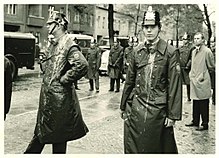Battle of the Tegeler Weg
A violent confrontation between the police and demonstrators, most of whom were connected to the SDS and attributable to the APO , on November 4, 1968 on Tegeler Weg in Berlin-Charlottenburg is referred to as the Battle of Tegeler Weg . In addition to students , workers and rockers are said to have been among the demonstrators. This street battle is considered a significant turning point in the history of the APO of the 1968 movement and went down in the history of the political left in Germany. 130 police officers and 22 demonstrators were seriously injured in the battle on Tegeler Weg.
History and course
On November 4, 1968, the first stage of an honorary court proceedings against the attorney and then APO activist Horst Mahler was scheduled in the Berlin district court on Tegeler Weg . As a result of the march to the Springer House on April 11, 1968, after the assassination attempt on Rudi Dutschke , Mahler had already been sued for damages by the Springer Verlag for the damage caused . In addition, after an application by the Attorney General to the Superior Court, Mahler was also to be excluded from the legal profession through an honorary court procedure. About 1000 demonstrators and counter-demonstrators appeared at the Tegeler Weg at this meeting of a court of honor, which had to clarify the question of whether, according to the current status of the investigation, a professional ban against Mahler was to be expected.
A truck parked near the demonstration was loading paving stones. The police, who in turn used tear gas and water cannons, were pelted with the stones by the demonstrators. Protesters tried several times to break into the courthouse. That didn't work and after about two hours the demonstrators were pushed back by the police over the Schlossbrücke into Otto-Suhr-Allee.
Importance and evaluation
After the assassination attempt on Rudi Dutschke in West Berlin, there was a high level of mobilization for the APO, an awareness that this high level of mobilization could not be maintained, especially in the Berlin SDS, was established in autumn 1968. Attempts were made to counteract this development of demobilization, according to a now widespread thesis on the battle on the Tegeler Weg, with a public confrontation with state power. The demonstration is often judged to have been planned with the aim of challenging the state authority even with the use of force.
The historian Heinrich August Winkler also assumes in his work The Long Way West from a deliberate provocation of the battle on Tegeler Weg by the SDS:
"Unrestrained acts of violence like the" Battle on Tegeler Weg "deliberately provoked by the Berlin SDS on November 4, 1968, did their part to discredit and isolate the" revolutionary avant-garde "of the student movement."
Opposing the assessment of the battle on Tegeler Weg as a planned use of violence, the thesis is also put forward that the demonstration against the court of honor proceedings against Mahler developed rather spontaneously and that the violence was not planned. Solveig Ehrler said in the Republican Club that the course of the demonstration and the stone throwing were not planned, but the use of colored eggs by the demonstrators was definitely planned.
The battle at Tegeler Weg is seen as the end of the peaceful APO movement and at the same time as the beginning of the violent confrontation between the radical political left and state power after 1968. This event is also considered to be the end of the anti-authoritarian currents in the SDS as well as important for the replacement of the fun guerrilla of the APO by an urban guerrilla .
Following the battle on the Tegeler Weg, there was an energetic debate in the SDS about violence, which ultimately contributed significantly to the split in the SDS.
The events of November 4, 1968 sparked discussions in the Republican Club as well. Among other things, the question was whether the street battle should be seen as a class struggle .
Movies
- Battle of the Tegeler Weg. Documentary. Germany 1988; Direction: Barbara Kasper, Lothar Schuster
Individual evidence
- ↑ a b The 68s. The bitter end on Stern.de . Retrieved May 22, 2009
- ↑ 3sat.online: What was left? Noise and violence . Retrieved May 22, 2009
- ↑ Jürgen Miermeister and Jochen Staadt: Provocations: the student and youth revolts in their leaflets 1965–1971, Luchterhand, 1980, p. 186.
- ↑ a b cf. Michael Ludwig Müller: Berlin 1968: The other perspective, Berliner Story Verlag, 2008, p. 287ff
- ↑ Klaus Hartung: November 4th, 1968: The day on which the movement won. Published in the Tagesspiegel on November 4, 2008. Last accessed on December 27, 2016.
- ^ Heinrich August Winkler: The long way to the west. German history from the “Third Reich” to reunification, Verlag CH Beck, Munich 2000, pp. 251f
- ↑ a b Extra service v. December 11-14, 1968: Republican Club About Demonstration and Violence . Retrieved September 22, 2009
- ↑ Thomas Claer: Mahler, Schily, demonstrators. 40 years ago the “Battle of the Tegeler Weg” raged, in justament, issue four 2008, p. 27 (PDF; 2.5 MB). Retrieved May 22, 2009
